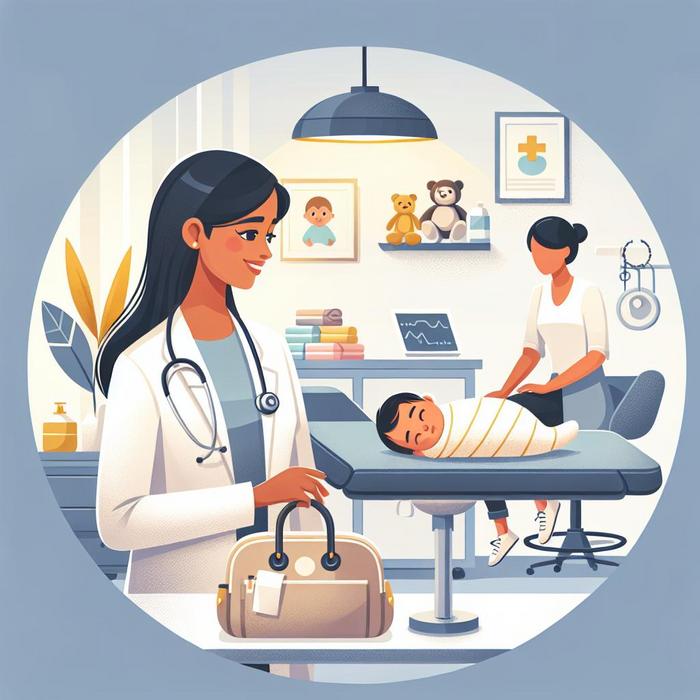Understanding the Importance of Your Baby’s First Doctor Visit
The birth of a child brings a flurry of emotions and a new set of responsibilities. One of these essential duties is ensuring your child’s health is top-notch. An integral part of this is their very first visit to the pediatrician. For many first-time parents, the baby’s first doctor visit can be anxiety-inducing. But, with proper preparation, knowledge, and understanding, you can ensure a smooth and stress-free experience for both you and your baby.
When Should You Schedule Your Baby’s First Doctor Visit?
Most pediatricians recommend scheduling the baby’s first doctor visit in their first week of life, typically between 3 to 5 days old. This crucial checkup, as explained by Summit Health, helps ensure your baby is transitioning well from womb to world. So, mark your calendars and remember, it’s alright to come with a list of questions. Your pediatrician is there to provide guidance and support during this exciting yet testing time.
What to Expect During Your Visit
Now that you’re preparing for the pediatrician visit, it’s vital to know what to anticipate. You’ll likely notice that your doctor is observing your baby’s behavior, checking their vitals, and monitoring their physical development. Here are some specifics:
- Weight, Length, and Head Circumference: These measurements help track your baby’s growth patterns and overall health status.
- Body Examination: The doctor will meticulously examine your baby’s body, including their eyes, ears, skin, heart, and hip alignment.
- Feeding and Sleep Patterns: Be prepared to discuss your baby’s feeding and sleep habits. If bottle feeding, the effects of nipple flow rates on feeding success might also be a topic of discussion.
- Vaccinations: Your pediatrician will discuss the vaccination schedule and administer any due shots (if any).
Tips to Prepare for the Visit
While understanding what to expect lays the groundwork, additional preparation can make the visit go even smoother. Here are some tips:
- Document Your Baby’s Behaviour: Monitor and document your baby’s feeding, sleep, and bowel movements. Understanding the science behind your baby’s behaviors, like laughing, can also provide valuable insights.
- Prepare Your Questions: Get your queries ready. Jot down your concerns or observations about your baby’s health, behavior, or development.
- Don’t Forget Essential Items: Carry essentials like extra diapers, clothing, feeding equipment, and your baby’s health insurance card.
An important aspect to consider when preparing for your baby’s first doctor visit is recognizing and managing changes in their feeding habits, especially during illness. Knowing how to manage feeding during illness can be an asset during the pediatrician visit and beyond.
Embracing the Journey
Your baby’s first doctor visit is just the first step in a long journey of ensuring their health and development. Regular checkups play a pivotal role in this ongoing process. Resources like My Health Finder and networks like BabyBumps on Reddit can provide additional guidance and support as you navigate this new landscape. Remember, it’s okay to ask questions, and it’s okay to feel overwhelmed. You’re not alone on this journey, and every step is a learning opportunity, bringing you closer to mastering the art of parenting.
Continuing Care: Doctors Visits After The First
After the first pediatrician visit, you will have a better understanding of how your baby’s growth compares to standard infant development charts. The Mayo Clinic provides a quick guide to understanding these evaluations. The next visits and check-ups are also vital for assessing the growth milestones your baby should ideally reach at a particular age. You can also expect the pediatrician to review your baby’s diet, sleep patterns, and development, among other things.
Emergencies and Sick Visits
Now that we’ve covered the first visit and what to expect in the following well-baby visits, it’s paramount to be aware of situations that might necessitate an unscheduled visit to the doctor. Sometimes, your baby might face health issues such as colds and flu, allergies, minor injuries, or development concerns. These warrant immediate attention. Babylist covers some common reasons for sick visits in their first pediatrician visit guide. Always remember, when in doubt, it’s better to seek medical help than to keep guessing what might be wrong.
Choosing a Pediatrician
If you’re yet to find a pediatrician for your child, it’s crucial to keep a few factors in mind. Look for a doctor with a good reputation, consider the location of their office and availability, review their office hours, and confirm they accept your health insurance. Other factors such as the doctor’s experience, communication style, and approach to health and wellness are essential to consider. Treat the first visit as an interview of sorts for the pediatrician and make sure they’re a good fit for your family.
Pediatrician Visit: Not Just a One-Time Event
It’s important to remember that baby doctor visits aren’t just a one-time event. They are ongoing and form part of your child’s healthcare routine. As Health Partners points out in their blog post, regular check-ups are fundamental to keeping track of your baby’s development and well-being. It also presents a perfect opportunity for your pediatrician to catch potential health problems before they become serious.
The Importance of Vaccines
Another essential consideration during the pediatrician visits is the vaccination schedule. Vaccines protect your baby from several diseases, some of which could be fatal. Summer Health’s blog offers more on what to expect at your pediatrician visit during the baby’s first year, including insights on vaccinations. Make sure to discuss with your pediatrician what vaccines your baby should get and when.

